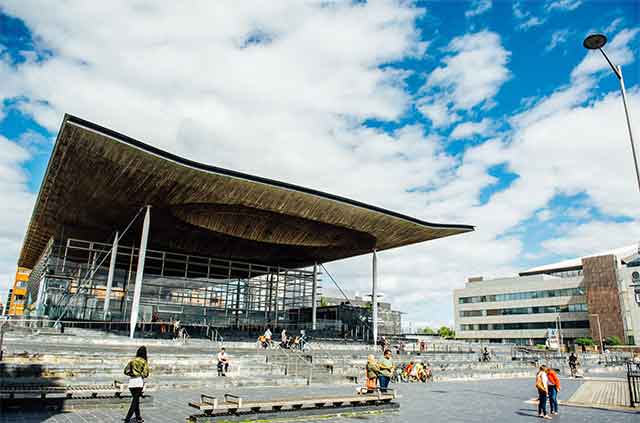Wales and Ireland should strive for greater ties at a crucial juncture in the countries’ shared history, the Senedd heard.
Delyth Jewell led a debate on a report following an inquiry into Wales-Ireland relations.
The international affairs committee chair stressed the fiercely strong connections that link Wales and Ireland through history, language, culture, music and more.
Plaid Cymru’s deputy leader raised concerns about the Welsh Government’s response to some of the committee’s recommendations.
She told MSs that ministers would not commit to additional reporting on Wales-Ireland relations due to financial constraints.
Ms Jewell said: “We believe the Welsh Government is doing itself a disservice by not capturing its strategic approach to its relations and communicating this work more fully.”
‘Opportunities’
The South Wales East MS argued Wales-Ireland relations have never been more important.
She told the chamber: “Brexit has wrought changes and questions remain as to how joint work between the two nations will be resourced in future years.
“We were told by staff at University College Dublin that while EU funding for some projects has ended – opportunities have not.”
Ms Jewell highlighted that this year £150,000 has been committed to Agile Cymru, which supports economic cooperation across the Irish Sea.
However, she warned that work could be undermined by suggestions funding may not be available next year because it would require re-prioritising other budgets.
Brexit
Mark Drakeford told MSs there is no more long-standing relationship than that between Wales and Ireland, describing it as a “living bridge that goes back into our histories”.
The first minister raised the 2021-25 plan agreed between the Welsh and Irish Governments.
He said: “The key to it was Brexit and our efforts to mitigate the harm that Brexit has done to people here in Wales, but also to people in Ireland as well.”
Prof Drakeford said it is a particularly rich period in the Wales-Ireland relationship, with ministers meeting Irish counterparts face to face four times this year.
He told the Senedd he attended the British-Irish Council last week, meeting his Irish counterpart Leo Varadkar and speaking to the leaders of four Northern Ireland parties.
The first minister said cooperation on future renewable energy projects in the “golden triangle” between the ports of Wales, Ireland and Brittany is on the agenda.
He cautioned that some of the committee’s recommendations would require agreement of the Irish Government and, in one case, the British-Irish Council.
Tom Giffard, for the Conservatives, pointed to opportunities arising from Brexit despite some “hiccups” arising from the transition.
He highlighted that the UK Government secured participation in the Horizon research and innovation programme through a deal with the EU.
Education links
Heledd Fychan, who lived in Ireland for nine years, called for more opportunities for Welsh students to attend Irish universities, and vice versa.
The Plaid Cymru MS for South Wales Central said: ”Often, our students are encouraged to go to England, but equally those connections with Ireland have a huge amount of potential.”
Pointing out that Wales does not send as many members to the British-Irish Parliamentary Assembly (BIPA) as it could, Ms Fychan called for urgent action to address the gap.
David Rees said he led the Senedd’s delegation – including Darren Millar, Sarah Murphy and Heledd Fychan – which attended BIPA’s meeting in Kildare at the end of October.
The Labour backbencher said important topics such as tourism, second homes and clean energy were discussed.
‘Minimal focus’
Samuel Kurtz, who worked on ferries crossing the Irish sea between Pembrokeshire and Rosslare, raised concerns about a lack of work on economic ties.
He cited the report as saying: “Evidence we received revealed minimal focus on the economic and trade links in the Welsh Government’s approach to Wales-Ireland relations.”
The Conservative pointed to clear energy opportunities and the role of Wales’ new freeports.
Alun Davies, the Labour MS for Blaenau Gwent, described the report as an endorsement of the work of the Welsh Government on reinvigorating the relationship.

